
Traditionally in lab, mostly glassware was used to perform the experiment and conduct scientific research, but their fragility poses a safety risk in fast-paced lab environments. From pipettes and flasks to petri-dishes and test-tubes, glass was highly utilised for its clarity, chemical resistance, and with its ability to be sterilized and reused. However, it came with some limitations; was heavy, fragile, and prone to breakage.
The shift towards the single-use plastic began in the mid-20th century. As research emerged and sterility became highly critical, glass required extra efforts in cleaning and sterilization which was time consuming and costly, leading to delayed experimentation.
Here comes the breakthrough, that occurred with the invention of medical-grade plastic such as polystyrene (PS), polypropylene (PP), and polycarbonate (PC). Disposable plastic Petri plates were first developed in the late 1940s, and ware extensively utilised in the microbiology laboratories. By the 1950s and 1960s, plastic had been moulded into pipette tips, centrifuge tubes, and culture flasks that could be pre-sterilized, used once, and discarded, removing the chance of cross contamination. Researchers soon discovered the benefits: plastics were lightweight, robust, safe, and cost less to mass-produce. Over time, these advantages trumped the history of glassware, and plastics became the new standard in laboratories worldwide.
Why Polypropylene (PP) & Polystyrene (PS)
At Abdos Life sciences, we equally care about our environment and take all the sustainable steps to protect it. We manufacture our products using high purity virgin Class VI medical grade polypropylene (PP) & polystyrene (PS) conforming to US FDA 21 CFR, which is free from rubber and heavy metal. These plastic stands out for the following reasons:
Lower Global Warming Potential (GWP)
Life cycle assessments (LCAs) show that PP, PS are designed to be safer and purer when compared to the common plastic. Whereas PS & PC require less energy to produce per kilogram and are lighter in weight means reduced transportation emissions, lowering the overall carbon footprint.
High Strength-to-Weight Ratio
PP is lightweight & mechanically strong, meaning less material is required to produce durable consumables. While without additional coating or glass alternatives, PS offers great clarity, minimizing material use and resource consumption.
Efficient Processing
Both PP and PS can be precisely injected into mold at low melting temperatures than many engineering plastics, which reduces the energy consumption during manufacturing. Their ability to form complex, uniform shapes with minimal waste ensures maximum resource efficiency.
Reduced Additives, Fewer Leachable
Abdos uses high-purity virgin Class VI medical-grade PP and PS, which are free from plasticizers, heavy metals, and harmful additives. This medical grade plastic uses very few additives which leads to the simpler recycling processes and lower risks of environmental contamination.
Recyclability Potential
Unlike mixed-material products that are difficult to process, both PP and PS (category #5 and #6 plastics) have exceptional recyclable potential. While direct recycling of lab plastics faces biosafety restrictions, their polymer structure supports future recycling innovations and circular economy frameworks.
Compatibility with Bio-Based Alternatives
PP and PS are already being produced from bio-based feedstocks (such as plant-derived hydrocarbons), making it possible to shift away from fossil fuel dependence without redesigning lab infrastructure.
Sustainability at Abdos
The manufacturing process at Abdos begins with high-quality polypropylene (PP) granules, sourced from petrochemical or bio-based origins and compliant with international standards for purity and safety. These granules are melted and moulded using fully automated injection moulding machines, ensuring precise dimensions, smooth finishes, and consistent quality across products like pipette tips, Petri dishes, and centrifuge tubes. Automation reduces human error and supports efficient, large-scale production.
Post-moulding, products undergo strict quality checks and are sterilized through methods such as electron beam or gamma irradiation. Packaging takes place in cleanroom environments to maintain sterility. While PP and PS are technically recyclable, lab-use restrictions often limit direct recycling. To address this, Abdos is exploring bio-based alternatives and innovative recycling solutions to help these materials re-enter the circular economy and reduce environmental impact.
Shaping the Future with Abdos
Plastic will always be at the forefront in laboratories and play crucial role in advancing research. At Abdos Life Sciences, sustainability is central to product design and manufacturing. Using high-purity, Class VI medical-grade PP, free from harmful additives, Abdos produces labware with lower global warming potential, high strength-to-weight ratios, and efficient recyclability. These plastics are processed through automated, energy-efficient moulding systems and sterilized in clean environments.
We believe science needs to be both creative and accountable in the future. Our goal is to provide researchers with top-notch laboratory items that consistently support findings and help create a more sustainable future.